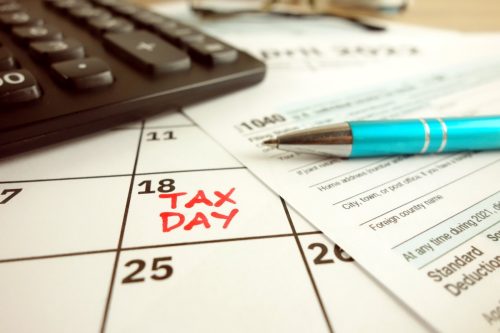IRS Says Taxpayers in These Areas Don’t Need to File Until Oct. 16

This year’s tax season has been underway for just over a month now, and many taxpayers have already gotten theirs out of the way. As of Feb. 18, the Internal Revenue Service (IRS) has already received nearly 37 million returns. But you shouldn’t worry if you haven’t even thought about doing your taxes yet, as there’s still plenty of time. And if you live in certain parts of the country, you might have many more months to get your taxes in. Read on to find out why the IRS now says some taxpayers don’t need to file until Oct. 16.
READ THIS NEXT: IRS Has Issued 8 Million Refunds—Here’s How Much People Are Getting Back in 2023.
The tax deadline is April 18 this year.

Most taxpayers have until mid-April to file their taxes. The IRS started accepting and processing returns on Jan. 23 for the 2023 tax season, and while the tax filing deadline usually falls on April 15, it’s delayed by a few days this year due to the weekend and the District of Columbia’s Emancipation Day holiday on April 17.
“By law, Washington, D.C., holidays impact tax deadlines for everyone in the same way as federal holidays,” the IRS explained in a Jan. 12 press release.
So, everyone has until April 18 to submit their 2022 returns—but some taxpayers now have even longer to get their taxes done.
The IRS previously extended the deadline for certain taxpayers.

The IRS recognizes that circumstances outside of taxpayers’ control may hinder their ability to meet the normal filing deadline. When it comes to disaster situations, the agency often provides tax relief.
“Federal law permits the IRS to grant taxpayers affected by a federally declared disaster or a significant fire additional time to perform certain time-sensitive acts, including filing returns and paying taxes when the original or extended due date of the return or payment falls within the disaster period,” the agency explains.
Prior to the start of the 2023 tax season, the IRS had already extended the filing deadline for specific taxpayers. Last month, the agency announced that some residents of three different states would have until May 15 to file their returns as a result of various Jan. 2023 disasters. These included victims of severe winter storms, flooding, and mudslides in California, as well as victims of severe storms, straight-line winds, and tornados in both Georgia and Alabama.
Now, the deadline has been extended further.
RELATED: For more up-to-date information, sign up for our daily newsletter.
The new deadline for these taxpayers is Oct. 16.

Taxpayers impacted by last month’s disasters in California, Georgia, and Alabama are getting another break from the IRS. In a Feb. 24 press release, the agency announced that it is extending the tax deadline for these victims even further after previously postponing it to May.
“Disaster-area taxpayers in most of California and parts of Alabama and Georgia now have until Oct. 16, 2023, to file various federal individual and business tax returns and make tax payments,” the IRS said.
In order to qualify for this extension, you must reside in a disaster area designated by the Federal Emergency Management Agency (FEMA) in one of the three states. Most California counties qualify, and several Georgia and Alabama counties are affected as well. You can check the IRS website for a full list of eligible areas.
Qualified taxpayers won’t receive a penalty for late taxes.

Anyone who is concerned about meeting the tax deadline can request an extension from the IRS to get more time to file their return. But they still have to pay any taxes they may owe by the original due date, or they’ll face penalty charges for late payments.
On the other hand, if you’re eligible for a disaster-based deadline extension, you won’t get fined for filing your taxes after April 18, whether you owe money or not.
“The IRS automatically provides filing and penalty relief to any taxpayer with an IRS address of record located in the disaster area,” the agency explained. “Therefore, taxpayers do not need to contact the agency to get this relief.”
On the off-chance that you do get fined despite qualifying for disaster relief, you can contact the IRS to get it fixed.
“If an affected taxpayer receives a late filing or late payment penalty notice from the IRS that has an original or extended filing, payment or deposit due date falling within the postponement period, the taxpayer should call the number on the notice to have the penalty abated,” the agency added.
Best Life offers the most up-to-date financial information from top experts and the latest news and research, but our content is not meant to be a substitute for professional guidance. When it comes to the money you’re spending, saving, or investing, always consult your financial advisor directly.